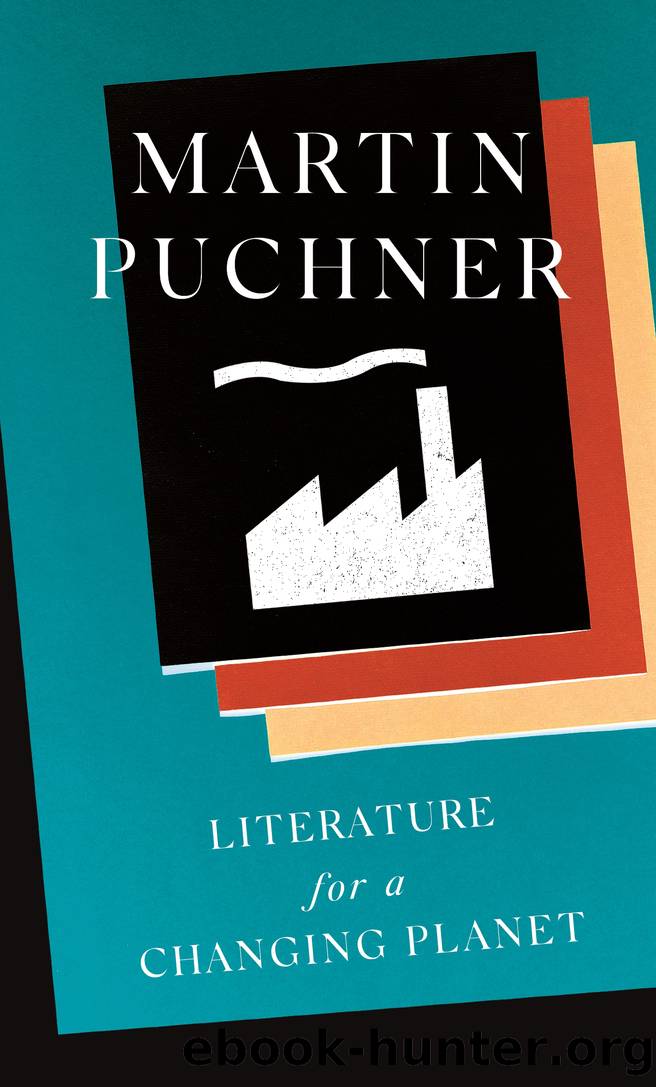Literature for a Changing Planet by Martin Puchner

Author:Martin Puchner
Language: eng
Format: epub
Publisher: Princeton University Press
Published: 2021-11-10T00:00:00+00:00
When Goethe explored Chinese literature, for example, the most canonical Chinese novels, The Journey to the West and Dream of the Red Chamber, had not been translated yet. The same was true of several of the other texts I have mentioned, including the Epic of Gilgamesh, which was still buried underneath the rubble of Ashurbanipalâs library, the Tale of Genji, which did not yet circulate outside Japan, the Popol Vuh, which was still languishing in a library, all but forgotten, and the Epic of Sunjata, which had not yet been written down and was instead transmitted orally, as the Homeric epics had been for centuries. What is necessary, then, is to update Goetheâs canon and then to read this new canon in light of climate change.
My suggestion that we might use world literature anthologies as critical tools is also, as I have mentioned, personal, in that itâs how I first got introduced to the big-picture kind of thinking about literature. It happened when I was asked, about fifteen years ago, to step in as general editor of the Norton Anthology of World Literature. I have since come to appreciate what anthologies can do and consider it worth dwelling on their history and purpose, an underresearched topic.2 So please allow me a brief moment of intellectual autobiography.
At first, the category of âworld literatureâ seemed hopelessly daunting. Very quickly I realized that I didnât even know how much I didnât know, how much literature there was that I had never even heard of (including, it pains me to admit, the Panchatantra, the Jataka Tales, the Popol Vuh, and the Epic of Sunjata). Panic set in. How could I ever wrap my head around something as large as world literature? Desperate, I began looking for books that would give me guidance.
The first group of texts I read were on world history, which I quickly discovered was a thriving field, with works that tried to synthesize and distill, compare and contrast, and, above all, tried to tell an overall story of humankind. This genre ranged from the scholarly to the popular, but in either approach its task was to think about the broad contours of history, to pinpoint historical forces and agents.3 I was intrigued by commodity histories such as the ones offered by Mark Kurlansky in Cod: A Biography of the Fish That Changed the World (1998) and Big Oyster: History of the Half-Shell (2006), which he seasoned with Salt: A World History (2002). These stories addressed the histories of natural resources and the economic and cultural forces behind their extraction.4 I supplemented them with other big-picture works such as Jared Diamondâs Guns, Germs, and Steel: The Fates of Human Societies (1997) and J. R. McNeill and William H. McNeillâs The Human Web: A Birdâs-eye View of World History (2003). Since then, big-picture thinking has seen astonishing successes, such as Yuval Noah Harariâs Sapiens: A Brief History of Humankind (2011).5
With this reading course complete, I turned to literature, looking for the literary equivalent to world history.
Download
This site does not store any files on its server. We only index and link to content provided by other sites. Please contact the content providers to delete copyright contents if any and email us, we'll remove relevant links or contents immediately.
| Books & Reading | Comparative Literature |
| Criticism & Theory | Genres & Styles |
| Movements & Periods | Reference |
| Regional & Cultural | Women Authors |
4 3 2 1: A Novel by Paul Auster(12362)
The handmaid's tale by Margaret Atwood(7747)
Giovanni's Room by James Baldwin(7313)
Asking the Right Questions: A Guide to Critical Thinking by M. Neil Browne & Stuart M. Keeley(5751)
Big Magic: Creative Living Beyond Fear by Elizabeth Gilbert(5739)
Ego Is the Enemy by Ryan Holiday(5406)
The Body: A Guide for Occupants by Bill Bryson(5070)
On Writing A Memoir of the Craft by Stephen King(4924)
Ken Follett - World without end by Ken Follett(4715)
Adulting by Kelly Williams Brown(4560)
Bluets by Maggie Nelson(4541)
Eat That Frog! by Brian Tracy(4509)
Guilty Pleasures by Laurell K Hamilton(4435)
The Poetry of Pablo Neruda by Pablo Neruda(4087)
Alive: The Story of the Andes Survivors by Piers Paul Read(4014)
White Noise - A Novel by Don DeLillo(3999)
Fingerprints of the Gods by Graham Hancock(3983)
The Book of Joy by Dalai Lama(3965)
The Bookshop by Penelope Fitzgerald(3839)
